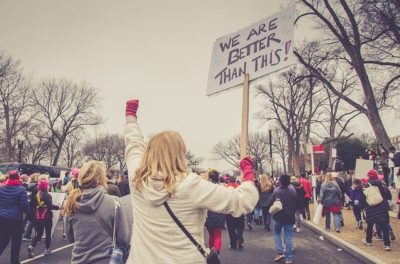
In the recent past, the movement for social justice and equality has gained significant momentum across the United States. In Chicago, specifically, widespread protests have sprung up regularly since George Floyd died at the hands of police officers in Minnesota. Unfortunately, some individuals have used peaceful protests as cover to commit criminal acts, like rioting or looting.
It can be confusing to separate law-abiding protesters from criminally motivated rioters or looters, especially as the media often uses these terms interchangeably. But from a legal standpoint, these terms have highly different meanings.
The First Amendment & Protesters in Illinois
Under the First Amendment, a protester is fundamentally someone who exercises their constitutional right to freedom of expression. Adopted as part of the Bill of Rights in 1791, the First Amendment prohibits government interference with regard to religion or expression.
Most importantly in this context, the First Amendment guarantees the right to free speech, peaceful assembly, and government protest. Though the other First Amendment protections are also extremely vital, including freedom of religion and a free press.
Overall, the First Amendment protects every citizen’s right to assemble and speak out against the government. And as a constitutional right, it is extremely difficult for federal or state government to impede these freedoms.
Taken as a whole, the term protester applies to individuals who participate in peaceful demonstrations against government policies. Generally speaking, protesters must secure a permit from local government to engage in these demonstrations.
So long as protesters abide by the law while demonstrating, they are merely exercising their constitutional rights under the First Amendment. Lawful and peaceful protesters are not committing a criminal offense.
720 ILCS 5/25-1 & Rioters in Illinois
Under Illinois law at 720 ILCS 5/25-1, a rioter is basically someone who assembles with others to commit unlawful activities. This offense is referred to legally as a mob action. There are three different versions of mob actions under Illinois law.
A person commits mob action if they knowingly assemble with at least one other person:
• To recklessly use force or violence to disturb the peace;
• With the intent to commit a misdemeanor or felony crime; or
• For the purpose of vigilante justice or a similarly unlawful exercise of authority.
The penalty for committing mob action depends on the circumstances of the offense. Mob actions involving intended crimes or vigilante justice are typically charged as Class C misdemeanors. If convicted, the maximum punishment includes 30 days in jail and $1,500 in criminal fines.
On the other hand, mob actions involving reckless use of force or violence are typically charged as Class 4 felonies. If convicted, the statutory punishment includes one to three years in prison and up to $25,000 in criminal fines.
In addition to the penalties described above, Section 25-1 also features a community service requirement for mob action violations. Mob action offenders must complete 30 to 120 hours of community service.
720 ILCS 5/25-4 & Looters in Illinois
Under Illinois law at 720 ILCS 5/25-4, a looter is essentially someone who takes advantage of a disastrous situation to commit theft. More precisely, there are three elements to looting offenses in Illinois.
First, the offender must knowingly enter another person’s residential or commercial property, without legal authority or justification.
Second, there must be a disaster or similar impairment that impedes regular security measures at the residential or commercial property in question. Applicable disasters can be natural, such as a hurricane, fire, or earthquake. Or these disasters can be human, such as a riot or mob.
Third, taking advantage of the disaster situation and impaired security measures, the offender must exert unauthorized control over another person’s property. In other words, a looter uses a disaster situation to commit a theft crime.
Any person who commits looting in violation of Section 25-4 is guilty of a Class 4 felony. If convicted, the punishment is the same as described above for mob actions. On top of the standard penalties, looters must complete at least 100 hours of community service and pay restitution to the property owner in question.